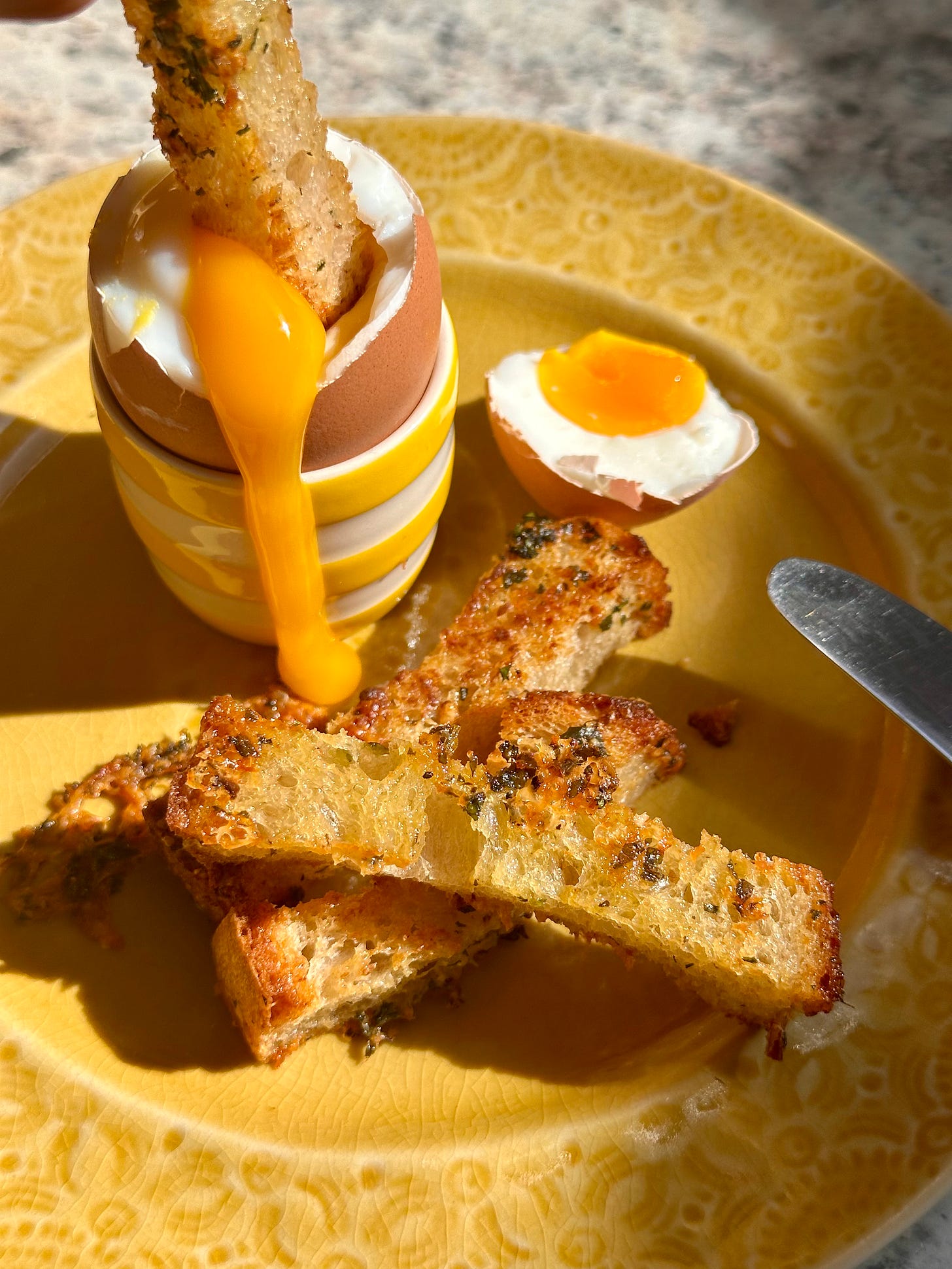Hello! Welcome to today’s SW+ all about savoury ways of cooking eggs (this is a paid subscriber only-edition of the newsletter). Each month I tackle a big topic in one go, so that you have these handy reference guides at your fingertips — e.g. on kitchen organisation, on making and cooking pasta, on all the ways to prepare potatoes and so on. Thank you for being here.
EGGS 101

Eggs make the perfect solo meal as well as the ultimate crowd-pleasing brunch. They can work for breakfast, lunch or dinner (though I do associate them most with mornings, hence this month’s playlist). Eggs are key in both savoury and sweet contexts. They are supremely versatile. And in spite of the considerable increase in the price of a dozen eggs over the last few years, they are still one of the cheapest sources of protein out there. All of this to say: eggs have a lot to recommend them.
This month’s deep-dive has been particularly gratifying because although there were some techniques that I was excited to share with you, there were also some egg preparations that I had never focused on enough to master: namely, poaching.
Until about a week ago, poaching an egg still felt like rolling the dice to me… would it hold together? Would it swirl around in the water like wispy, formless Dementor? Impossible to know. Well, no longer: I finally got the technique down and I’m pleased to report that it doesn’t involve vinegar (I can always taste it) or the creation of a whirlpool (anxiety-inducing).
Here’s what to expect:
You’re storing your eggs wrong
How to check the freshness of your eggs (+ when older eggs are a bonus)
The best boiled eggs are not boiled (+ a recipe for pimped-up soldiers)
Meal-prep eggs that’ll keep for up to a month
The secret to foolproof mayonnaise (+ mayo in 15 seconds for when you’re in a hurry)
Uncomplicated poached eggs (+ the best way to serve them)
Deliciously simple scrambled eggs
A different way to fry your eggs (less mess! less smell! less oil!)
The bougiest eggs are also the easiest
The canape egg for all of your summer parties
Late-night “I’m drunk” eggs
The only tortilla I ever liked
Let’s get into it!
P.S. Your email provider has likely truncated this email — simply click on the title of this post to be see the full version in your browser.
YOU’RE STORING YOUR EGGS WRONG

I don’t know who needs to know this (hi mum) but your eggs don’t need to be stored in the fridge.
More to the point, it’s useful to have your eggs at room temperature when cooking or baking because they’ll cook more evenly, plus ingredients emulsify much better when they’re at the same temperature (e.g. in cake batters, or when making mayonnaise).
The one exception!
It can be useful to chill your eggs if they’re particularly old.
As an egg ages the proteins strands start to break down, resulting in runnier whites and more delicate yolks. Popping the eggs in the fridge will help firm things up a little, which can be useful if you’re separating the yolks from the whites.
HOW FRESH?
Don’t be a slave to the best before date on your egg box — to check the freshness of an egg, carry out the simple float test:
The freshest eggs are best for:
Poaching (they hold their shape)
Frying (as above)
Or anything requiring raw eggs e.g. mayonnaise, tiramisu
Moderately fresh eggs are great for:
Soft or hard-boiling (they’ll peel a little easier)
Scrambled
Omelettes
Meringues (it’s easier to separate the whites from the yolks when they’re not super fresh)
Eggs on the cusp of being too old should be used for:
Cakes
Quiches
… since they’ll be spending an extended period of time in the oven.
BOILED, NOT BOILED
Since learning that steaming your eggs > boiling your eggs I’ve never looked back, and here’s why:
It yields a more even cook (as we’ve covered on Small Wins before, steam-cooking = gentle cooking)
It feels altogether less messy/faffy (no waiting for a whole pan of water to boil, the eggs are easier to fish out of the pan etc)
It makes the eggs easier to peel




